Building Strong Communities Through Local Food: Highlights From the 2025 LFPT Gathering
go.ncsu.edu/readext?1075673
en Español / em Português
El inglés es el idioma de control de esta página. En la medida en que haya algún conflicto entre la traducción al inglés y la traducción, el inglés prevalece.
Al hacer clic en el enlace de traducción se activa un servicio de traducción gratuito para convertir la página al español. Al igual que con cualquier traducción por Internet, la conversión no es sensible al contexto y puede que no traduzca el texto en su significado original. NC State Extension no garantiza la exactitud del texto traducido. Por favor, tenga en cuenta que algunas aplicaciones y/o servicios pueden no funcionar como se espera cuando se traducen.
Português
Inglês é o idioma de controle desta página. Na medida que haja algum conflito entre o texto original em Inglês e a tradução, o Inglês prevalece.
Ao clicar no link de tradução, um serviço gratuito de tradução será ativado para converter a página para o Português. Como em qualquer tradução pela internet, a conversão não é sensivel ao contexto e pode não ocorrer a tradução para o significado orginal. O serviço de Extensão da Carolina do Norte (NC State Extension) não garante a exatidão do texto traduzido. Por favor, observe que algumas funções ou serviços podem não funcionar como esperado após a tradução.
English
English is the controlling language of this page. To the extent there is any conflict between the English text and the translation, English controls.
Clicking on the translation link activates a free translation service to convert the page to Spanish. As with any Internet translation, the conversion is not context-sensitive and may not translate the text to its original meaning. NC State Extension does not guarantee the accuracy of the translated text. Please note that some applications and/or services may not function as expected when translated.
Collapse ▲Twenty-nine Extension professionals gathered together in Lee County on Monday, May 19th for the bi-annual Local Food Program Team (LFPT) Gathering, led by Hannah Dankbar, NC State Extension Local Food Program Manager (and LFPT co-president), and Allison Walker, Randolph County 4-H Agent (and LFPT co-president). The LFPT brings together county agents and campus specialists to create training and resources to build capacity for supporting local food systems in Extension across the state. Membership is open to all N.C. Cooperative Extension professionals with many ways to serve on the team. The annual gathering serves as a chance to network, provide workgroup updates, discuss the evolving landscape of local food system development, conduct other business as needed, and usually includes an educational session or tour.
The day began with a small group business meeting for the coordinating committee which is made up of co-chairs from each work group and members of the executive committee. The executive committee is made up of four parts – campus and county co-presidents and co-secretaries, treasurer, and the administrative liaison.
After being joined by all of the other members, the full gathering began by sharing out workgroup updates. The team is made up of 7 workgroups, with 6 active at this time.
Farm to Early Care and Education (ECE)
- Co-chairs: Kyle Hood and Ashley Szilvay
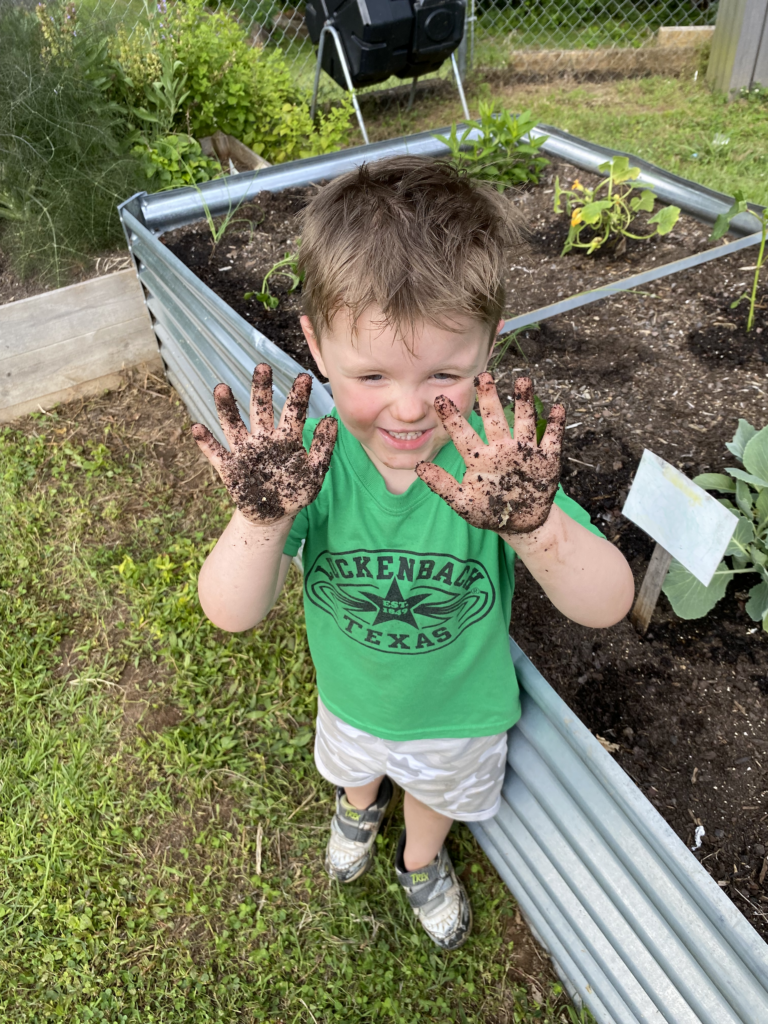
- The workgroup is focused on local food education for birth to age six and hosts bi-monthly meetings to share county-level initiatives and promote agent professional development.
- Mini-grants were distributed to support agents with purchasing supplies and beautification that help to extend educational offerings and expand capacity for Extension.
- The group is also working to create and provide in-depth training to build confidence among workgroup members for doing this type of work.
Farm to School
- Co-chairs: Remi Ham and Morgan King
- The School Garden Online Course had 106 participants in 2024 including 39 Extension agents and so far this year have had 46 participants. The course includes 21 training videos and presentations which is about 5 hours of content.
- The Cooking in the Classroom Course is currently in development.
- The Farm to School website and YouTube channel are continuing to be built out and the group encourages people to follow and subscribe for updates and resources.
Food Security
- Co-chairs: Morgan Marshall and Alyssa McKim
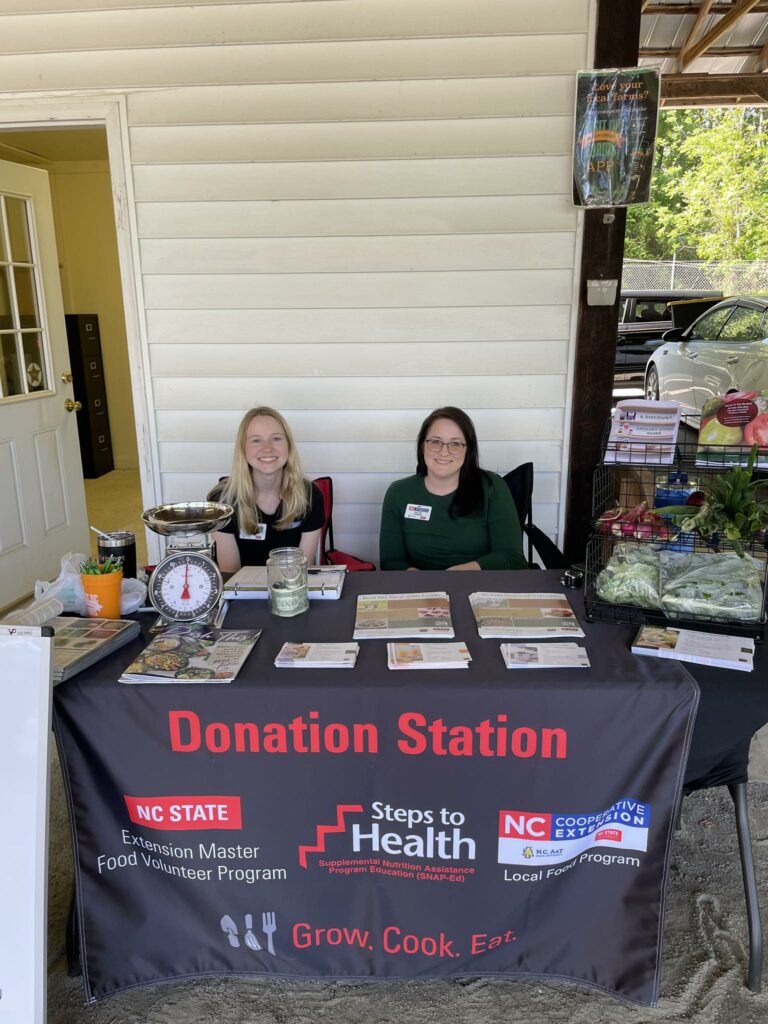
- Donation Stations are up and running for another market season. The workgroup partners with Steps to Health to provide training, technical assistance, and supplies. They are currently working with 32 counties – 19 are established and running with the remaining 13 still planning to launch this year or in some other stage of progress.
- The workgroup distributed mini-grants to support agents/counties engaging in food security programming, with a priority on teamwork and collaboration across program areas. Eleven applications were submitted and five were selected.
- A food security resource scan is in early stages and the group plans to align with the Southern Region Program Leaders Network to help streamline the process and to garner information for both scans without asking for duplicate information from Extension professionals.
Growing Farm Capacity
- Co-chairs: Hannah Dankbar and Meredith Favre
- The primary project of the workgroup is Small Farm Boot Camp which has 14 flexible models and can be implemented in-person, virtual, or hybrid. Forty-five registered agents completed the online training to access the curriculum. The program is tailored for new and beginning farmers and is easy to deliver and adaptable to county needs.
- The workgroup coordinates with other Extension programs to build support for small farms across Extension and NC.

Economic Impacts
- Co-chairs: Kenny Sherin (county co-chair position is open)
- The focus areas for this group are the county infographics which you can read more about later in the article. Additionally this group has an agritourism curriculum and agritourism spotlights.
Local Food Preparation
- Co-chairs: Tammy Brunelle and Wykia Macon
- The focus of the workgroup so far has been rebuilding due to prior staff turnover so recruitment efforts have been strong as well as an informal needs assessment to determine what agents would like to see from the group and what would be most useful for their work.
- A survey was shared to multiple listservs to identify training priorities. Fifty-four responses were gathered and the top choices selected included outdoor cooking best practices, knife skills, incorporating local foods, and cooking with herbs. The survey asked what format would be best for agents and it was determined that in-person district training would be best and could actually incorporate all four topics. The group will continue working on these and share details soon.
Following workgroup updates, Hannah shared that the updated county agriculture profiles are in the final stages and will be available online mid-June. This project is a collaboration between the NC State Extension Local Food Program, NC FarmLink, and the Center for Environmental Farming Systems (CEFS). North Carolina is one of the most diversified agriculture states in the nation and these infographics are designed for economic developers, planners, local food advocates, and community members to understand the impact of their county and region to the overall NC agricultural economic impact. The group also created discussion points for County Agriculture Profiles to help facilitate conversations around opportunities for sustainable economic growth at the county level. There are infographics for counties, councils of government (COGS), and the state.
Other announcements included two upcoming opportunities for workgroup members and Extension professionals.
- The LFPT is partnering with NC State Extension’s Community Resource Development (CRD) Program and the North Carolina Community Development Professionals (NCACDEP) Association for its second year of a joint conference. This year’s theme is “Harvesting Our Future: Nature, Nourishment, and Neighborhoods” and will be held in Waynesville (Haywood County) October 28th-30th. Registration and a request for session proposals will be shared in July.
- During the Fall 2025 semester, Hannah along with Dr. Dara Bloom, Associate Professor, Assistant Director of CEFS, and Local Foods Extension Specialist, will host AEHS 554: Introduction to Local Food Systems, a graduate level course where students will learn about local food systems history, terminology, research and model projects in North Carolina.
Before enjoying a catered local lunch, the team wrapped up with small group discussions about two timely topics for Extension professionals working in local food system development and took some final time to share out across groups.
- How can LFPT pivot and be helpful as budgets and funding changes?
- What do new administrators need to know about Extension local food programming?
In these discussions both groups highlighted the cross-program nature of local food system development and how it provides an opportunity for their whole office to work together. Another topic that came up was that supporting local food systems provides opportunities for Extension to work across their community as a trusted partner. Each group reported specific action items and messaging that LFPT will use moving into the new fiscal year.
After lunch, Erica Calderon, NCDA&CS Agritourism Director joined the group to share program updates about agritourism and ag marketing, including updates to the Visit NC Farms program.
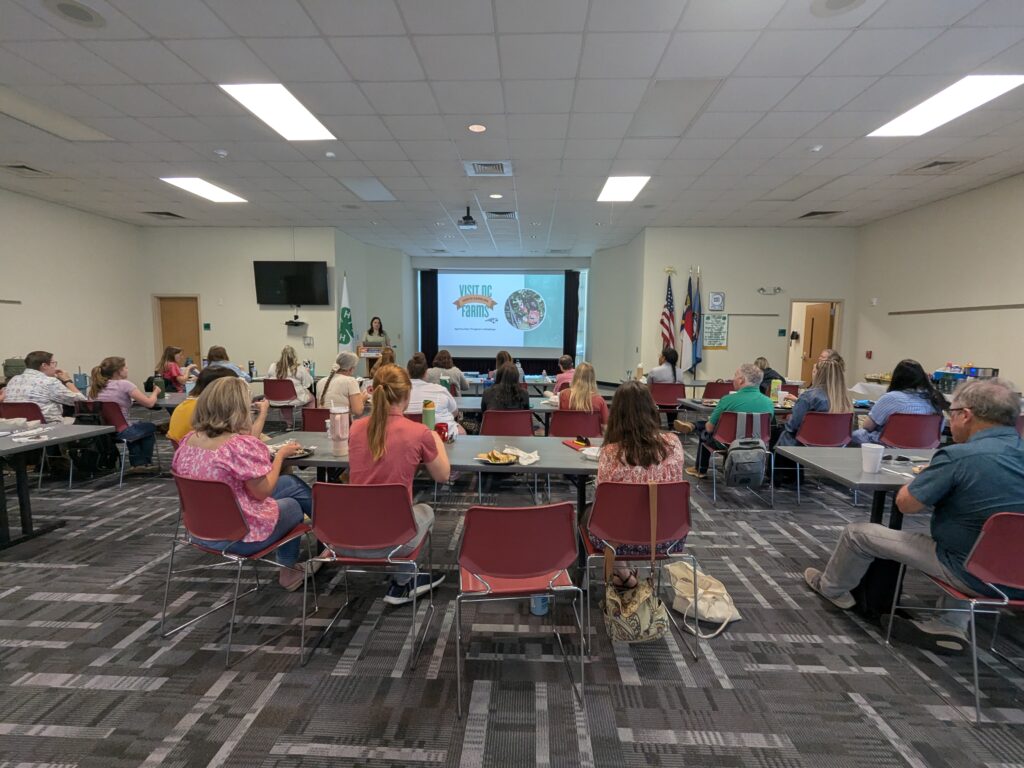
Last but certainly not least Meredith Favre, Lee County Local Foods Agent and Local Foods Coordinator (LFC) shared a short presentation about the Pilgrim’s Sanford Agricultural Marketplace (PSAM), a new infrastructure designed to serve as a community epicenter to address food insecurity, preserving the city’s history while also investing in the future. The multi-functional space will serve as the new site for the Sanford Farmers Market while also housing a commercial kitchen, a demonstration and teaching kitchen, educational classroom space, and an outdoor entertainment space. This marketplace is a partnership between N.C. Cooperative Extension, City of Sanford and Downtown Sanford Inc. and is a testament to the importance of including agriculture in community and economic development. The LFPT ended the day with a tour of the site currently under construction.
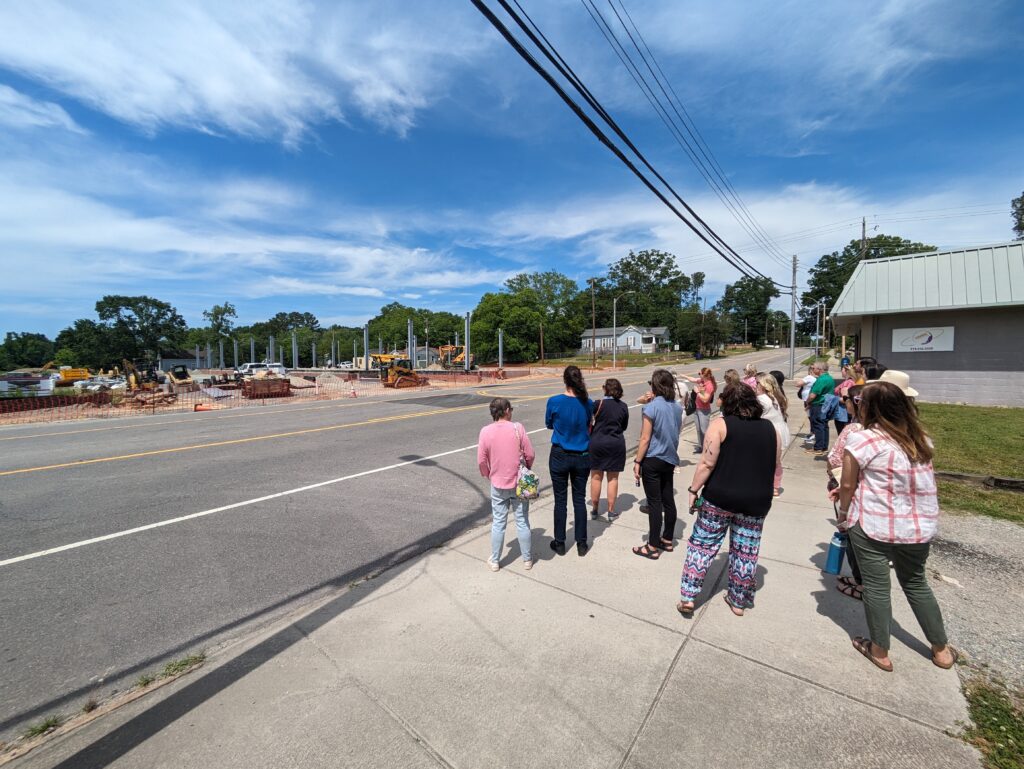
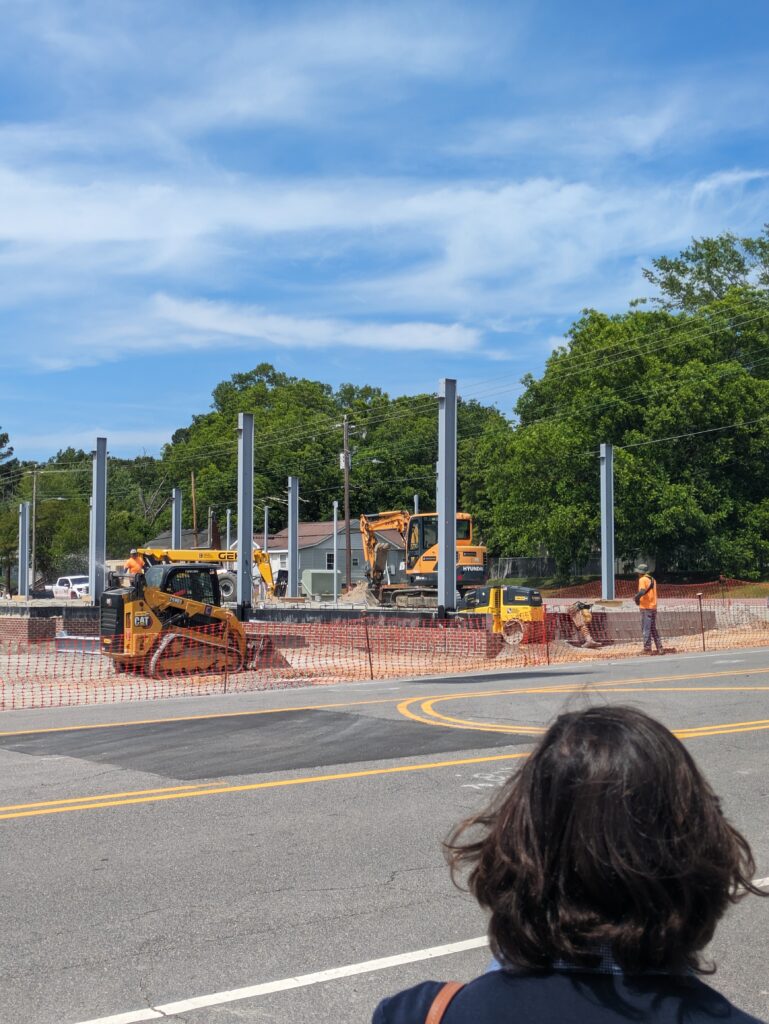
If you are interested in joining the Local Food Program Team you can contact Hannah Dankbar (hcdankba@ncsu.edu) or learn more about the team and membership here.


